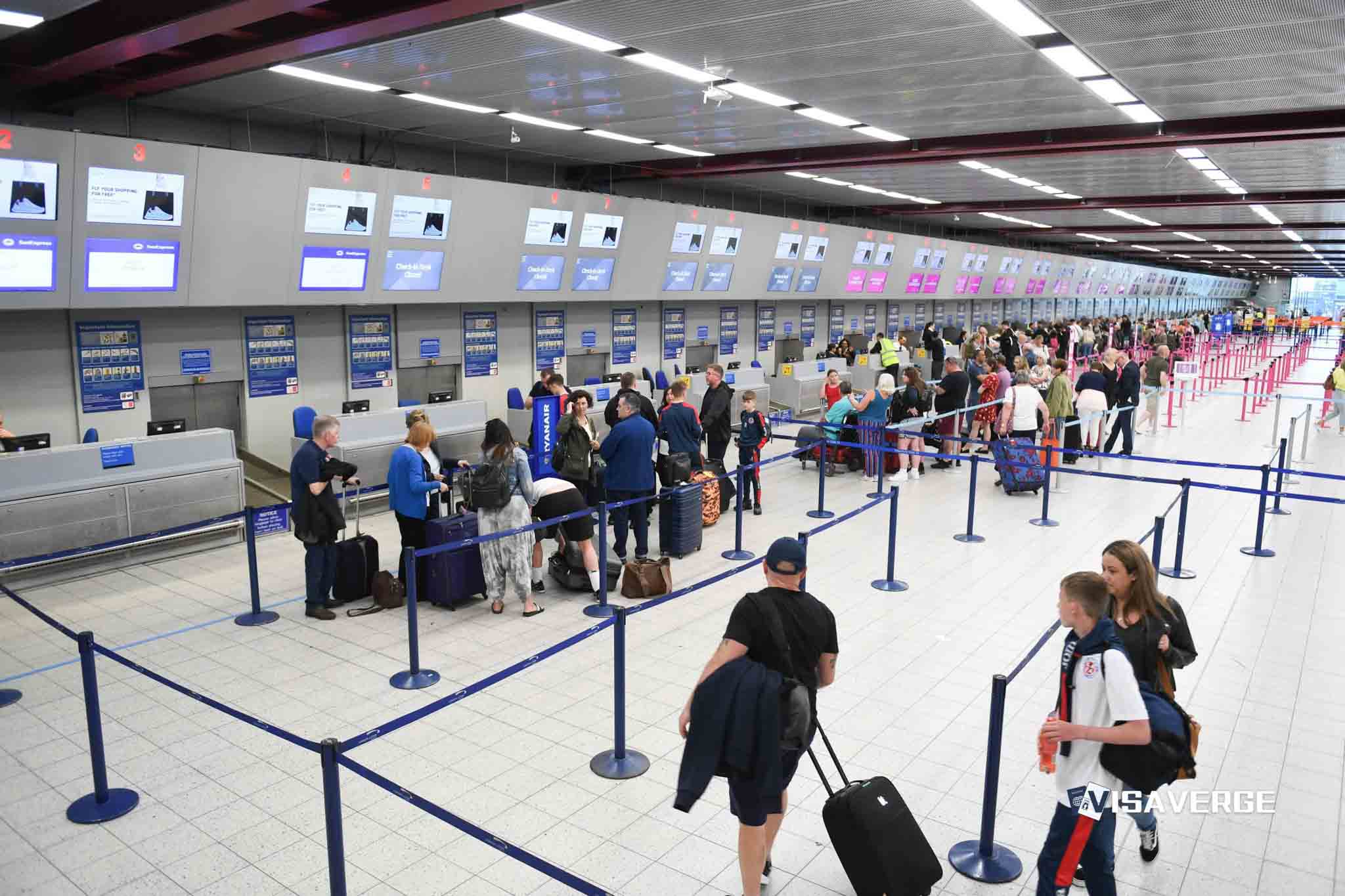Key Takeaways
• Freddie, a CBP beagle, was violently attacked at Dulles Airport on June 25, 2025, but recovered quickly.
• The attacker, Hamed Ramadan Bayoumy Aly Marie, pled guilty, paid veterinary care, and was deported June 27, 2025.
• Freddie seized over 100 pounds of prohibited agricultural products protecting US agriculture from pests and diseases.
Freddie, a five-year-old beagle working with U.S. Customs and Border Protection (CBP), returned to duty at Dulles Airport less than two weeks after a violent attack left him injured. The incident, which happened on June 25, 2025, drew national attention and highlighted the important role of detector dogs in protecting the United States 🇺🇸 from agricultural threats.
On the morning of June 25, Freddie was performing his regular duties as an agriculture detector dog at Washington Dulles International Airport. His job, like that of other CBP K9 officers, is to sniff out items in luggage that could bring pests or diseases into the country. That day, Freddie alerted his handler to a passenger’s bag arriving from Cairo, Egypt 🇪🇬. What happened next shocked both airport staff and the public.

The passenger, identified as 70-year-old Egyptian national Hamed Ramadan Bayoumy Aly Marie, reacted violently. He kicked Freddie with such force that the 25-pound dog was lifted off the ground. Freddie suffered bruises to his right rib area, but, thankfully, he did not have any lasting injuries. CBP officers quickly restrained Marie and handed him over to Homeland Security Investigations (HSI) agents for prosecution.
Marie’s actions were not only cruel but also illegal. He was charged under federal law—specifically, 18 USC 1368, which makes it a crime to harm law enforcement animals. The very next day, June 26, Marie pleaded guilty in the U.S. District Court for the Eastern District of Virginia. He was credited for time served, ordered to pay for Freddie’s veterinary care, and deported to Egypt 🇪🇬 on June 27, 2025.
Christine Waugh, CBP’s Area Port Director for Washington, D.C., spoke out strongly after the attack. “Any malicious attack on one of us is an attack on all of us, and CBP will continue to work with our investigating and prosecuting partners to deal swift and severe justice to perpetrators,” she said. Her words reflected the deep respect and care CBP has for its canine partners.
Freddie’s recovery was closely followed by the public and the media. CBP shared updates and photos of Freddie enjoying treats and resting during his recuperation. The outpouring of support for Freddie was overwhelming, with many people expressing gratitude for the work done by CBP dogs like him.
By July 9, 2025, Freddie was back at work at Dulles Airport. His quick return showed his resilience and the quality of care he received. CBP officials and the public celebrated his recovery, and his story became a symbol of the dedication and bravery shown by law enforcement animals every day.
The attack on Freddie also brought attention to the strict policies in place to protect CBP K9 officers. The swift prosecution and deportation of Marie sent a clear message: assaults on law enforcement animals will not be tolerated. The U.S. Attorney’s Office for the Eastern District of Virginia handled the case, ensuring that justice was served quickly.
Freddie’s work on June 25 led to the seizure of more than 100 pounds of prohibited agricultural products. These included 55 pounds of beef, 44 pounds of rice, 15 pounds of vegetables, two pounds of corn seeds, and a pound of herbs. All these items were confiscated to prevent the introduction of pests and diseases that could harm American farms and food supplies. This is a key part of CBP’s mission at ports of entry across the United States 🇺🇸.
CBP’s Beagle Brigade, of which Freddie is a member, plays a vital role in protecting U.S. agriculture. Every day, CBP teams intercept more than 3,500 prohibited plant and animal products at U.S. ports of entry. These dogs are specially trained to detect even small amounts of food, plants, and other items that could carry dangerous pests or diseases.
The Beagle Brigade has a long history of service. Detector dogs like Freddie are chosen for their keen sense of smell and friendly nature. They work alongside human officers to keep the country safe from threats that are often invisible to the naked eye. Their work helps prevent outbreaks of diseases that could devastate crops, livestock, and the economy.
Federal law provides strong protections for law enforcement animals. Under 18 USC 1368, anyone who harms a police or CBP dog can face serious federal charges. This law recognizes the important role these animals play in public safety and border security. Violations are prosecuted as serious offenses, and the penalties can include jail time, fines, and deportation for non-citizens.
The incident at Dulles Airport also raised public awareness about the legal consequences of interfering with detector dogs. Many people may not realize that harming a law enforcement animal is a federal crime. The case showed that the United States 🇺🇸 takes these offenses seriously and acts quickly to protect its K9 officers.
CBP’s response to the attack on Freddie was swift and thorough. Officers at Dulles Airport acted immediately to restrain the attacker and ensure Freddie received medical care. The agency also worked closely with federal prosecutors to bring the case to court within 24 hours. This quick action helped reassure the public and showed CBP’s commitment to its canine partners.
The story of Freddie’s recovery and return to duty has inspired many people. It highlights the dedication of both the dogs and the officers who work with them. It also shows the importance of public support for law enforcement animals. Many people sent messages of encouragement to Freddie and his handler, and CBP received offers of help from animal lovers across the country.
Freddie’s case also serves as a reminder of the challenges faced by CBP officers and their K9 partners. Every day, they work in busy airports and border crossings, dealing with thousands of travelers and shipments. They must be alert to the risk of smuggling, disease, and even violence. The attack on Freddie was a rare but serious event, and it underscored the need for strong protections and support for these teams.
CBP has reiterated its commitment to protecting its canine officers. The agency has promised to prosecute any assaults on detector dogs to the fullest extent of the law. This commitment is part of a broader effort to ensure the safety and well-being of all law enforcement animals.
The public’s response to Freddie’s story has also helped raise awareness about the work of the Beagle Brigade. Many people have learned more about the important job these dogs do and the risks they face. The incident has sparked conversations about how to better protect law enforcement animals and support their handlers.
For those interested in learning more about the CBP K9 program or reporting similar incidents, the CBP official website (cbp.gov) offers detailed information. The site includes resources on the Beagle Brigade, legal protections for law enforcement animals, and contact details for the CBP Office of Public Affairs. Updates and videos of Freddie are also available on CBP’s official social media channels.
The case also has important implications for travelers. It serves as a reminder to respect law enforcement officers and their canine partners at airports and border crossings. Passengers should be aware that bringing prohibited agricultural products into the United States 🇺🇸 is not only illegal but can also lead to serious consequences. Detector dogs like Freddie are trained to find these items, and interfering with their work is a federal offense.
CBP officers and their K9 partners are on the front lines of protecting the country from threats that could harm people, animals, and crops. Their work is often unseen, but it is essential to national security and public health. The story of Freddie’s attack and recovery has brought this important work into the spotlight.
The legal outcome of the case was clear and decisive. Marie’s guilty plea and deportation showed that the United States 🇺🇸 will not tolerate violence against law enforcement animals. The order to pay for Freddie’s veterinary care also sent a message that those who harm these animals will be held responsible for their actions.
CBP’s Area Port Director, Christine Waugh, summed up the agency’s position: “Any malicious attack on one of us is an attack on all of us.” Her statement reflects the sense of unity and purpose among CBP officers and their canine partners.
Freddie’s return to work at Dulles Airport is a testament to his resilience and the support he received from his handler, veterinarians, and the public. His story has become a symbol of the bravery and dedication shown by law enforcement animals across the country.
The incident has also led to calls for even stronger protections for detector dogs and other law enforcement animals. Some advocates have suggested increasing penalties for assaults and providing more training for officers and the public on how to interact safely with K9 teams.
For now, Freddie is back on the job, doing what he does best—protecting the United States 🇺🇸 from agricultural threats. His quick recovery and return to duty are a source of pride for CBP and a reminder of the important role played by detector dogs at airports and border crossings.
Travelers passing through Dulles Airport may see Freddie and his fellow Beagle Brigade members at work. These dogs are friendly but focused, always on the lookout for items that could harm the country’s farms and food supply. Their presence is a reassuring sign that CBP is committed to keeping the United States 🇺🇸 safe.
As reported by VisaVerge.com, the case has set a strong example for how assaults on law enforcement animals will be handled in the future. The swift response by CBP, the U.S. Attorney’s Office, and Homeland Security Investigations shows that the United States 🇺🇸 takes these matters seriously.
For more information about the CBP K9 program, legal protections for law enforcement animals, or to contact the CBP Office of Public Affairs, visit the official CBP website. The site offers resources for travelers, media, and anyone interested in supporting the work of detector dogs like Freddie.
In summary, Freddie’s story is one of courage, resilience, and the strong bond between law enforcement officers and their canine partners. His quick recovery and return to duty are a testament to the dedication of everyone involved. The incident has raised public awareness, strengthened legal protections, and inspired support for the vital work done by CBP and its Beagle Brigade. As Freddie continues his work at Dulles Airport, he stands as a symbol of the important role played by detector dogs in keeping the United States 🇺🇸 safe.
Learn Today
CBP → U.S. Customs and Border Protection, the agency securing U.S. borders and enforcing customs laws.
Beagle Brigade → A special team of CBP detector dogs trained to find prohibited agricultural products at U.S. ports.
18 USC 1368 → Federal law penalizing harm or interference with law enforcement animals, including CBP police dogs.
Homeland Security Investigations (HSI) → Federal agency investigating and prosecuting crimes related to border security and customs enforcement.
Detector dog → A specially trained dog used by law enforcement to detect contraband or prohibited items.
This Article in a Nutshell
At Dulles Airport, CBP beagle Freddie was attacked but returned to duty within two weeks. His resilience highlights CBP’s dedication to protecting agriculture and law enforcement animals from threats and violence worldwide.
— By VisaVerge.com






